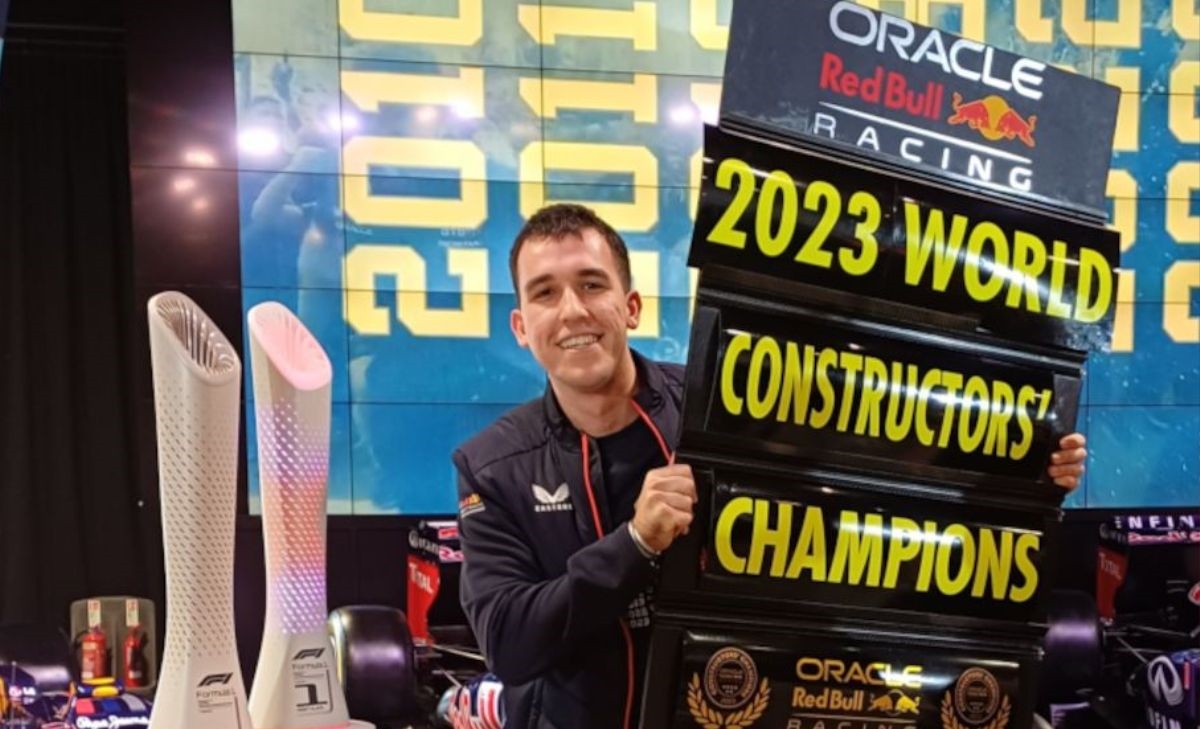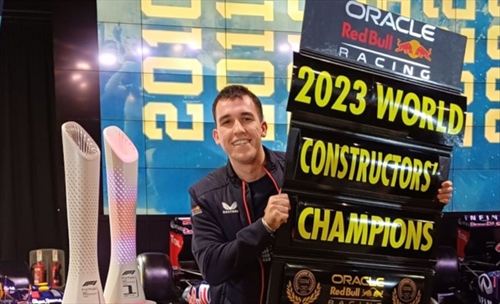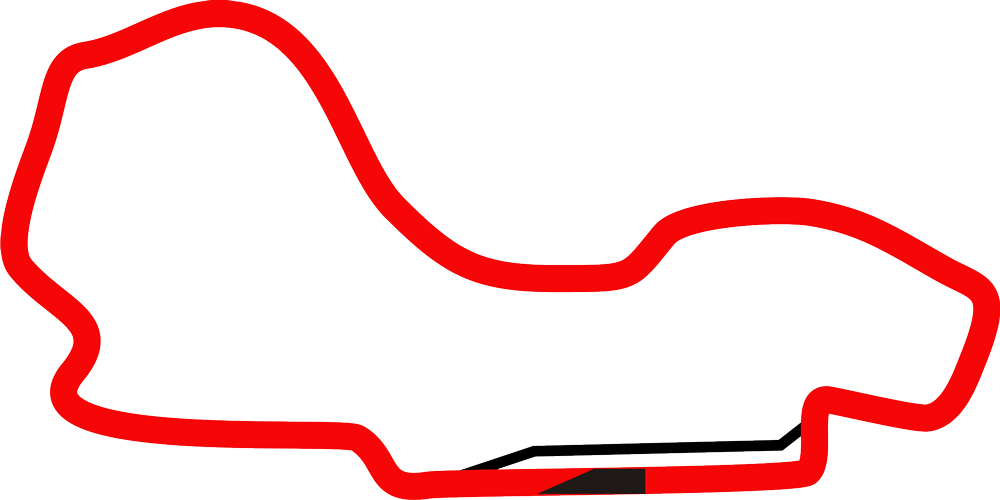Alex Burg is a mechanical engineer who worked for Red Bull for over a year, contributing significantly to the development of the 2026 engine turbocharger.
Looking for a new challenge, he decided to found - with his friend and colleague Javier Bermejo - the Racetrack Dynamics project, which aims to bring aspiring engineers closer to the world of Formula 1.
The FormulaWebMagazine.com staff had the pleasure and honour of asking him some questions, which are reported in the following interview.
FP: "Hello Alex, it's great to have you here with us. Let's start with talking about your F1 career".
AB: "Yes, of course. I got there really quickly. I've always been into cars. I, I think it all started from watching Top Gear, to be honest. I always liked it. And from since I was a kid, I always wanted to be able to say 'Hey, you look at that engine, look at that part, look at that thing: I made that'. That was always the thing I wanted to say. I mean, I've kind of done it now, I can die now and I'm fine.
"I'm from Spain and I went to university in the UK, in the North of England. I got into Formula Students, met lots of like really cool people and well, I just, you know, really got into it and everything. I started working really hard doing lots of like little side projects and things. Then I got hired by Red Bull Racing for the 2023 and '24 season, before I left to go back to university to finish off the masters in mechanical engineering".
FP: "Yeah. I wanted to ask you about that: how difficult is it to leave formula one to go back studying? How difficult is it to cope with that decision? From like a mental perspective..."
AB: "The last day is very difficult. The last day at Red Bull was like lots of nostalgia, lots of like, you know, 'do I really want to go?' That sort of doubt.
"There's always, there's always good things to leaving but, especially on that last day, it's all the bad things that make it really difficult. A lot of nostalgia.
"I went for like a little walk around the factory to see everything one last time. That's certainly difficult. And I mean, there you get to see some things that are just insane. Some things you can't see anywhere else: working at Red Bull PowerTrains with a budget of 110 million, you can't do that anywhere else. So I've got, I've got very good memories of, of Red Bull".
FP: "Getting back to working in Formula 1: how did the 'ups and downs' affect you?"
AB: "In my experience, as I was working on the 2026 Power Unit, so I can't really talk about weekend to weekend racing. What did happen at Red Bull PowerTrains was that most new versions of the engines were tested on the weekends for some reason. So you would spend weeks, if not months, working on the next iteration of the engine. Then most of us would leave on Friday for the race weekend and wouldn't know what happened until Monday morning.
"That was super hectic. And on Monday, we would all see the faces of the people and think 'oh, that didn't go very well' or 'everyone's happy and relaxed, we aced it'.
"It can be heartbreaking to work for so, so, so long, especially the last week before an engine fire-up... It's always super hectic: lots of fixing things and running, doing things, getting things sorted.
"It can be quite heartbreaking for it to fail, but also really rewarding when it works. Every now and then, whenever there was a big failure at least, it's always disappointing on the day, but over the next few weeks, people cheer up, people take it well.
"If you go around the office, you see people with like a broken piston or that sort of thing. Whenever it's their part that failed the engine, they often get it in like a little glass box to remind themselves that 'this caused an engine failure at this point'.
FP: "So, Alex, about the 2026 regulations. How much can you explain to the fans, as someone who is impractical with an engine, of course, what is changing, how much is changing, why people are saying it's going to be an engine formula or anything like that?"
AB: "To be honest, it probably changed a little bit since I left. I left in August of 2024. Since then, there's been a lot of talk about how much power can actually be delivered by the MGU side of things, which, I mean, it's in essence the whole point of the new regulations.
"The engines are fairly similar from a combustion side of things. It's the fact that they were aiming for a massive amount of electrical power from the MGU [Motor Generator Unit, e.n.]. That is something that, well, it's been a really big challenge for basically all of the teams and I'm not so connected with it anymore.
"You hear all the time that they're trying to lower that amount of energy because they're running out of energy at the end of straights and everything. So, to put it down simply for someone who's never heard it before, you know, they are quite similar. The turbo is a bit different. So the turbo is no longer an MGU-H. They're getting rid of the electrically assisted turbocharger. Now, it's a standard turbocharger you see in a car.
"The electric motor, which is actually tiny, if you see it, it's really tiny, it's so efficient and so well packed. It just takes a massive amount of energy from the ESS [Energy Store System, e.n.], the battery. It just has a lot more as a percentage of power of the whole Power Unit.
"I think it's going to be an engine-dominated season purely because it's difficult. Because we've been doing, you know, combustion engines have been around for 100 and more years. It's the electronic part that is difficult. It's difficult to get it right.
"It's difficult to have so much energy that you can choose where to deploy and do that correctly. F1 manufacturers don't have as much experience with that as with other power units, with the combustion power units. I'm sure there's more things, but from my experience working in the turbocharger department, we now have a whole new dimension to the problem, which is turbo lag.
"Turbo lag was not a thing in the past. You could always be harvesting from the exhaust gases and you can always be deploying power compressed there into the engine. Now, you can't force that.
"Now, you have to deal with turbo lag, which is a whole new dimension. There's a lot of super cool technical things you do, which I can't talk about. It's a whole new dimension and it's difficult and that's why it will make the difference.
"I think everyone understands the current engines very well, they're all kind of similar and everyone knows how they work. Figuring out this whole thing, on the other hand... Turbo lag hasn't been a problem in F1 for many, many, many years. Having to rethink all of that and adapt it to the current cars is difficult, so there will be some teams who get it right".
FP: "May I ask you to just swiftly present the Racetrack Dynamics project to the readers?"
AB: "Of course! It started, along with my colleague Javier, because he had always received lots of interest on LinkedIn, people wanting to, you know, get into Formula One, people asking for advice, people wanted to effectively have his job.
"People were always asking him 'how do I do this? How, how can I get where you are? Can I go to the factory and see you one day?' That happens a lot more than you would think, actually.
"That led to him designing this, our main course, the 'Complete Guide to Vehicle Dynamics in F1', which basically condenses his almost 10 years of experience into one single 12-hour course to teach people about vehicle dynamics and what he's learned in Formula One".
IF YOU WANT TO LEARN MORE ABOUT THE RACETRACK DYNAMICS PROJECT, DON'T MISS THE INTERVIEW WITH BOTH FOUNDERS - ALEX BURG AND JAVIER BERMEJO - COMING OUT JULY THE 20th.
FP: "That's very intriguing. My last request if you can share with us a very quick message to young students who might want to get into Formula 1 and how much it would mean to you to get people closer to Formula 1.
AB: "I think what I would say to someone wanting to get into F1 and struggling, or not knowing how to do it or something, what I would say is 'I understand you, because I've been there. I've been through that and all I can say is don't let anything or anyone stop you'.
"Just a quick example: someone I know that was working at Red Bull as well is from Barcelona. He told me his story of the time he was applying for all sorts of jobs: in the UK, in Switzerland, in Italy to work for Formula One. His friends were telling him 'why are you applying to a job in the UK? If you get it, you're gonna have to move there and speak in English and everything'. Well, one of them got to Formula One, one of them is my friend from Red Bull Racing, and the other ones are just someone in Barcelona. That is exactly why you don't have to let anyone stop you and do not think that any task is too big for you".
FP: "What can I say, Alex: that was brilliant. Good luck with Racetrack Dynamics and thank you so much for sharing all that with us!"
AB: "My pleasure Fabrizio, thank you".
Read also: EXCLUSIVE - Interview with Simone Scanu, «Formula Live Pulse» app founder
Main cover photo www.linkedin.com



